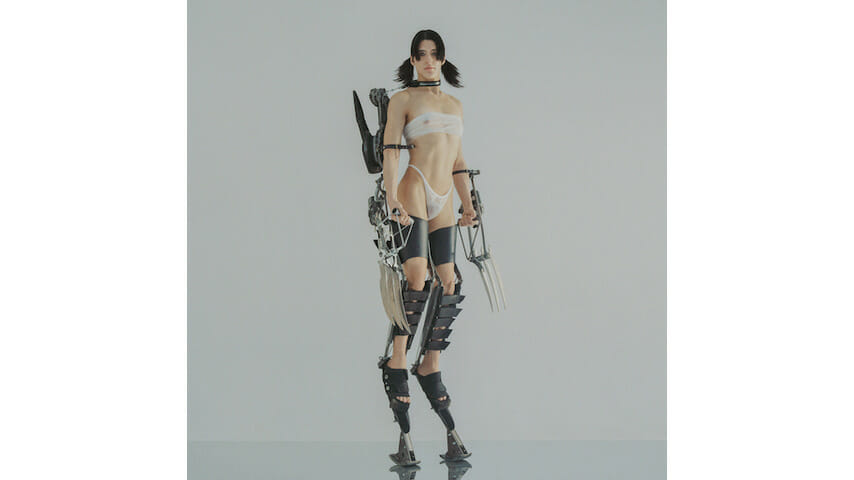In Arca’s world, playfulness has long intertwined with terror, rigidity with fluidity, human existence with cyborg life, abrasiveness with gentleness. These contrasts have defined Alejandra Ghersi’s earliest co-productions for Kanye West and FKA twigs, her unnervingly misshapen first solo recordings and album covers, her later co-production and co-writing alongside Björk and her 2017 self-titled left turn of slow-as-molasses, Spanish-language torch songs.
Ghersi’s unparalleled artistic versatility was on full display at last year’s immersive five-night Mutant;Faith experience at Manhattan performance art space The Shed. The unpredictable series—among her first performances since she began transitioning—involved stripper pole theremins, mechanical bulls and a lack of setlists. The Shed’s artistic director later called Ghersi “a glimpse of a future I hope for.” As she says on “Nonbinary,” the taunting-then-thrashing android missive that opens her new album KiCk i, “I do what I wanna do when I wanna do it.”
Mutant;Faith culminated in a video shoot for “Time,” KiCk i’s second track. In the video, Ghersi and her partner, Carlos Saez, embark on a winkingly devilish Manhattan romp that fits the song’s soft, warm heartbeat of alluring come-ons and hints at KiCk i’s myriad advances to what the Arca project even is. KiCk i is Ghersi’s first proper album post-transition (her 62-minute “single” from February is loosely related to KiCk i), and with her fully realized self comes ceaseless risk-taking, fully imploded boundaries and plain old joy. This is Arca’s most overt embrace of pop, her first album with guests, and her most spontaneous, lively, and even fun album. And all of those things are one and the same.
Other than the album artwork’s depiction of Ghersi as a weapon-wielding, stilt-donning superhuman, what’s likeliest to first stand out about KiCk i is its tight but stacked guest roster. Ever-ubiquitous flamenco pop sensation Rosalía trades bars with Ghersi on “KLK,” a body-rocking posse cut wrapped in a chaotic foil of reggaeton, dancehall and siren-like blares. SOPHIE, one of Ghersi’s few peers in distorting electronic music and preconceived gender notions, stops by for “La Chiqui,” which sounds at once like a car failing to start and a basketball eternally bouncing off a digital backboard. Shygirl guests on “Watch,” a bleating dancefloor number rooted in both Arca’s Mutant era and Shygirl’s usual industrial rap allure.
Björk herself even appears on “Afterward.” During the track’s dimly fluttering first half, she sings revered Spanish poet Antonio Machado’s “Anoche cuando dormía” (“Last night while I was sleeping”); the second half is a mournful, if not apocalyptic, abyss that diametrically opposes Ghersi’s heartwarming sentiment of “Come let me heal you.” It’s among KiCk i’s most tender moments, as are the Arca-esque closer “No Queda Nada” (“Nothing Remains”) and the reverbed piano soundscapes of “Calor” (“Heat”), both where Ghersi gorgeously declares her undying love for Saez.
Overtly romantic songs like these are, at least compared to Arca, rare on KiCk i. Ghersi instead spends most of the album gently softening the corrosive distortion of her pre-Arca output, upgrading the delirious and vividly entertaining vocal distortion and delivery of her first two EPs, wrapping her cyborg arms all the way around straight-up pop music, and dismantling outdated gender norms from within.
“Rip the Slit” is an acerbic queer rave, a bassy barrage with tongue-in-cheek brags (“I’ll hit you with that limp wrist, lipstick, slit lip”) delivered in alien helium coos. On the beatific “Mequetrefe,” Ghersi gloriously subverts the reggaeton she toyed with on Xen’s “Thievery” to reclaim the new track’s titular Venezuelan slang insult. She describes an eye-catching, unorthodox figure who cares not what others think: “Ella no toma taxi, que la vean, que la vean en las calles” (“She doesn’t take taxis, to be seen, let them see her on the streets”); “mira su pasito, le da, le da igual, que le da igualito” (“look at her tiny steps, she don’t care”).
If KiCk i sounds awfully fun for such disruptive music, that’s because it is. Case in point: “Riquiqui,” a commanding fusion of hip-hop, Bravo-ready shouting and gunfire-like samples. Following grating, rap-like, Spanish-language verses about sucking on the seeds of low-hanging mangoes, spreading mayonnaise on tables, and shimmying her hips just a little, Ghersi goes into full-on snarls during the outro. Throughout the song, she sounds as though she’s not just serving looks and making waves on the catwalk, but transforming in real-time. As she walks the walk and talks the talk, she makes it clear that KiCk i is her fullest vision yet for herself, the culmination of eight years of musically and visually rocketing outside the box, bridging seemingly diametrically opposed forces, and pursuing her muse no matter how strange others might find it. When she lets out a soft chuckle at the track’s end, she’s earned it.
Max Freedman is a Philly-based, New York-born freelance culture writer whom you can find whining about music, TV, and queer liberation (sometimes all at once) at Paste, The A.V. Club, FLOOD, Bandcamp Daily, MTV News, and many more places. You can find all his writing at his website, or you can follow him on Twitter, where he loathes tweeting original content and loves retweeting Jaboukie Young-White.
